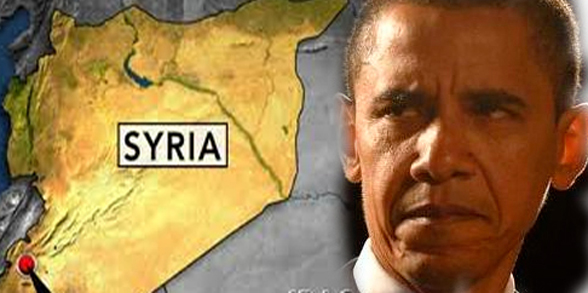Both Al-Qaeda and Obama have their sights on Syria.
President Barack Obama is depicted as a reluctant wartime president by the state-run media, but his no-holds-barred approach to arming the Jihadist terrorists inside Syria against the Assad regime raises questions about his reserved image and his real intentions towards Syria.
Italian geographer Manlio Dinucci sheds light on Obama's enthusiastic support for secret wars in his article, "Obama prefers to keep it hidden," writing:
President Obama does not like war. Not because he is a Nobel Peace prize-winner, but because open aggressive action would reveal US strategy and the interests upon which it is based. So he has launched a grand plan which, as the Washinton Post notes, "reflects the Obama administration’s affinity for espionage and covert action over conventional force."The Obama administration has armed and bankrolled the mischaracterized "rebels" in Syria since the beginning of the crisis, following a policy set forth by the Bush administration and its revolutionary neoconservative operators. Syria has been on the Pentagon's list of nation-state targets since the end of the Cold War, but it wasn't until after 9/11 that the plan went into motion.
Geopolitical analyst Tony Cartalucci, citing work done by award-winning journalist Seymour Hersh, says that 2007 was the year that marked a serious turn in Washington towards organizing for regime change in Syria.
In his article called, "US-Backed Syrian Opposition Demands Support for Al Qaeda," Cartalucci informs readers that Washington's recent condemnation of a particular terrorist group in the opposition in Syria was merely a ploy to save its narrative and mask its nearly limitless support for the "rebels." An excerpt:
As part of the US' charade in declaring support and recognition of the so-called "Syrian" opposition, it added one of the more extreme groups that make up the militant front operating inside Syria to a list of sanctioned terrorist organizations. The idea was to have a scapegoat to pin atrocities on while the West armed, funded, and provided military support for the rest of the extremist groups ravaging Syria.Singling out one group from the rest of the opposition was a desperate move by the Obama administration. They had no choice but to at least acknowledge the presence of some terrorists in Syria since most of the world has rejected their asinine narrative that it is just a bunch of freedom fighters against a dictator.
Obama disguises his sympathies for the Jihadist terrorist rebels in his public speeches by differentiating between the good rebels and the bad rebels, but they're all the same. And the "rebels" themselves do not hide their reliance on the tricks of the devil. They are proud to admit it.
The Jihadist terrorists are also proud to show off their chemical weapons capability. They show poorer judgment and have less compassion for Syrian civilians than officials in the Syrian government. If anybody is going to use chemical weapons in Syria it will more likely be them and their bloodthirsty backers rather than the Assad regime. As Cartalucci wrote on December 4 in his article, "US Repeats Syrian Chemical Weapons "Warnings":
It is unlikely that the Syrian government would use such weapons, thus giving the West the excuse it would need to directly intervene militarily, a scenario the West has been attempting to sell for the last 2 years, and particularly so following NATO's military operations in Libya throughout 2011.Bush took out Saddam by using the WMDs lie, famously saying that in his line of work "you have to keep repeating things to catapult the propaganda." Obama has committed himself to the same task regarding Syria. He is repeating the baseless propaganda talking point that Assad must be stopped from using chemical weapons against his people in order to stir the imagination of the American people and get them to support U.S. military action in Syria.
Conversely, NATO's proxy forces operating in Syria possess both the means and motivation to carry out chemical attacks, therefore blaming Syria's government and granting the West the impetus needed to intervene more directly.
As numerous observers have said, Obama likes to wage illegal wars under the public radar, but it's hard to hide the consequences of secret wars and secret arms shipments to terrorist groups when events like the Benghazi attack surface to the consciousness of the American public.
Despite his image as a wiser president than George W. Bush, Obama is not that bright. As national security expert Flynt Leverett said in a recent interview with Scott Horton:
"I don’t think the main problem with Obama is that he is a Democrat. I think the main problem is that he doesn’t really understand where the United States is in the world right now, he doesn’t really have a strategic vision for the United States, and whatever vision he does have doesn’t compel him enough, doesn’t matter enough to him that he is actually to spend and risk political capital to realize it."Obama is a script reader and one of the world's most powerful perception makers because of the prestige of his office. There is nothing special about him. He was chosen to execute a policy that was prepared long before he became president.
Obama's opposition to the Iraq War in 2002 was a smart political move and made him look like a prophetic visionary, but had he been president during that time he would've taken America to war in Iraq just as deceptively as Bush had done.
Obama's sneaky war on Syria is, to quote from his astute anti-Iraq war speech, "without a clear rationale and without strong international support," and, "will only fan the flames of the Middle East."
Obama thinks it is less dumb to secretly support Jihadist terrorist groups to destroy a country than to invade and occupy it, but the result is the same: a Middle East on fire.
And a Middle East on fire is what Obama and his handlers want.
